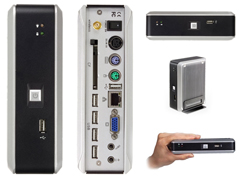
A Linux distribution is an operating system made from a software collection that includes the Linux kernel and often a package management system. They are often obtained from the website of each distribution, which are available for a wide variety of systems ranging from embedded devices and personal computers to servers and powerful supercomputers.
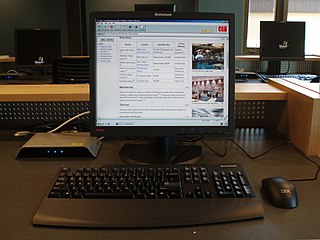
In computer networking, a thin client, sometimes called slim client or lean client, is a simple (low-performance) computer that has been optimized for establishing a remote connection with a server-based computing environment. They are sometimes known as network computers, or in their simplest form as zero clients. The server does most of the work, which can include launching software programs, performing calculations, and storing data. This contrasts with a rich client or a conventional personal computer; the former is also intended for working in a client–server model but has significant local processing power, while the latter aims to perform its function mostly locally.

A live CD is a complete bootable computer installation including operating system which runs directly from a CD-ROM or similar storage device into a computer's memory, rather than loading from a hard disk drive. A live CD allows users to run an operating system for any purpose without installing it or making any changes to the computer's configuration. Live CDs can run on a computer without secondary storage, such as a hard disk drive, or with a corrupted hard disk drive or file system, allowing data recovery.

A netbook is a small and inexpensive laptop designed primarily as a means of accessing the Internet. Netbooks were sold from 2007 until around 2013, when the widespread advent of smartphones and tablets eclipsed their popularity.
Filesystem in Userspace (FUSE) is a software interface for Unix and Unix-like computer operating systems that lets non-privileged users create their own file systems without editing kernel code. This is achieved by running file system code in user space while the FUSE module provides only a bridge to the actual kernel interfaces.
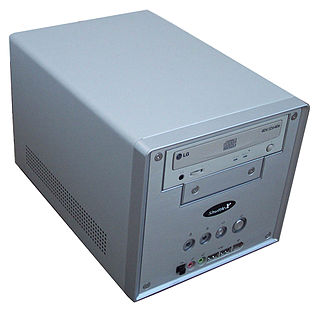
A barebone computer is a partially assembled platform or an unassembled kit of computer parts allowing more customization and lower costs than a retail computer system. They are available for desktop computer, notebook and server purposes, and in nearly any form factor. Manufacturers are also able to produce systems of a specialized or non-standard form factor, since the system is sold as a pre-built unit, with the motherboard and power supply already installed.
Jiangsu Lemote Tech Co., Ltd or Lemote is a computer company established as a joint venture between the Jiangsu Menglan Group and the Chinese Institute of Computing Technology, involved in computer hardware and software products, services, and projects.

Das U-Boot is an open-source boot loader used in embedded devices to perform various low-level hardware initialization tasks and boot the device's operating system kernel. It is available for a number of computer architectures, including M68000, ARM, Blackfin, MicroBlaze, AArch64, MIPS, Nios II, SuperH, PPC, RISC-V and x86.

A live USB is a portable USB-attached external data storage device containing a full operating system that can be booted from. The term is reminiscent of USB flash drives but may encompass an external hard disk drive or solid-state drive, though they may be referred to as "live HDD" and "live SSD" respectively. They are the evolutionary next step after live CDs, but with the added benefit of writable storage, allowing customizations to the booted operating system. Live USBs can be used in embedded systems for system administration, data recovery, or test driving, and can persistently save settings and install software packages on the USB device.
The Linutop is a small, light, environmentally friendly nettop computer containing a metal case and no moving parts, that runs the Linutop OS. It is sold by Linutop SAS of Paris, France. Linutop Kiosk software and Linutop Tv server offer a full Digital signage solution. A variety of QT applications oriented towards secure web browsing and digital signage are available in the Operating system. Linutop is multimedia-capable and offers line-out/mic-in for sound. The device can be configured easily into a LTSP thin client. Linutop is suited for use in internet cafés, public libraries and schools.

Intel Active Management Technology (AMT) is hardware and firmware for remote out-of-band management of select business computers, running on the Intel Management Engine, a microprocessor subsystem not exposed to the user, intended for monitoring, maintenance, updating, and repairing systems. Out-of-band (OOB) or hardware-based management is different from software-based management and software management agents.
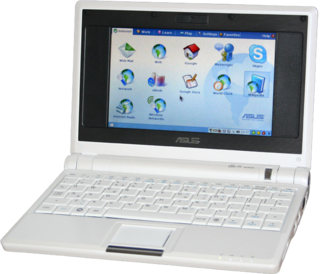
The ASUS Eee PC is a netbook computer line from Asus, and a part of the ASUS Eee product family. At the time of its introduction in late 2007, it was noted for its combination of a lightweight, Linux-based operating system, solid-state drive (SSD), and relatively low cost. Newer models added the options of Microsoft Windows operating system and rotating media hard disk drives (HDD), and initially retailed for up to 500 euros.

gOS or "good OS" was an Ubuntu-based Linux distribution created by Good OS LLC, a Los Angeles-based corporation. Its CIO David Liu described that after meeting Enlightenment and open source people, he realized that his dream to bring Web 2.0 applications into mainstream use could be achieved by creating a Linux distribution that made it easy for users to access Google and Web 2.0 applications. David Liu went on to create the Chinese Twitter clone called Wozai (我在), leaving gOS officially defunct.
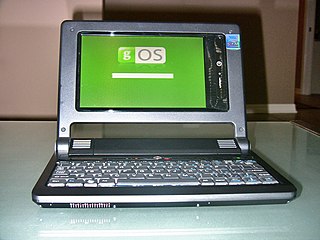
The CloudBook is a discontinued x86 subnotebook, or Ultra-Mobile PC developed by Everex using a VIA processor, chipset, and NanoBook reference design. It competed with the Asus Eee PC, the OLPC XO-1 and the Classmate PC. The device was categorized as a netbook when it was around 2008.

Ubuntu Netbook Edition (UNE), known as Ubuntu Netbook Remix (UNR) prior to the release of Ubuntu 10.04, is a discontinued version of the Ubuntu operating system (OS) that had been optimized to enable it to work better on netbooks and other devices with small screens or with the Intel Atom CPU.
Paul C. Kim is the Director of Marketing for Everex a supplier of personal computers, notebooks and ultra-mobile PCs. Mr. Kim currently serves as the developer and lead visionary for Everex marketing. Known for developing unique and innovative PC products, his responsibilities include managing the daily and long-term promotional, and positioning strategies for the 25-year-old American PC company based in Fremont, California .

A personal computer, often referred to as a PC, is a computer designed for individual use. It is typically used for tasks such as word processing, internet browsing, email, multimedia playback, and gaming. Personal computers are intended to be operated directly by an end user, rather than by a computer expert or technician. Unlike large, costly minicomputers and mainframes, time-sharing by many people at the same time is not used with personal computers. The term home computer has also been used, primarily in the late 1970s and 1980s. The advent of personal computers and the concurrent Digital Revolution have significantly affected the lives of people.

The Skytone Alpha-400 is a Linux-based low-cost netbook with a 7 in 800×480 LCD screen, introduced in 2008. Its measurements (length×width×depth) are 210 mm × 140 mm × 32 mm and it weighs 0.65 kg.
Chromebook is a line of laptops, desktops, tablets and all-in-one computers that run ChromeOS, a proprietary operating system developed by Google.

Librem is a line of computers manufactured by Purism, SPC featuring free (libre) software. The laptop line is designed to protect privacy and freedom by providing no non-free (proprietary) software in the operating system or kernel, avoiding the Intel Active Management Technology, and gradually freeing and securing firmware. Librem laptops feature hardware kill switches for the microphone, webcam, Bluetooth and Wi-Fi.

